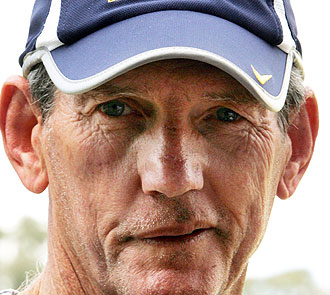Why a Dragons Victory Will Make Wayne Bennett Rugby League’s Greatest Coach
Jack Gibson is considered by many to be the greatest rugby league mentor ever and arguably the greatest Australian coach of any sport. His record is certainly something to behold.
The rugged yet highly intelligent Gibson made an impact right away in coaching. In 1967, Gibson took over as head coach from Bert Holcroft at Eastern Suburbs after the Roosters had gone winless in 1966 and who had gone 8-63-1 over the previous four years, winning three wooden spoons in the process. In 1967, Eastern Suburbs returned to the semi-finals and did the same in 1968 with 13 wins and 14 wins respectively. The turnaround of the Roosters was almost entirely Gibson’s doing. He did very little outside recruitment, preferring to promote from within with the likes of Johnny Peard, Bill Mullins, Johnny Mayes and “Bunny” Reilly- the core of the Roosters premiership teams in ’74 and ’75- all developing and debuting on Gibson’s watch. Gibson had turned the Roosters from easybeats to a fast, defence oriented team who could win football games.
Gibson then moved to the Dragons in 1970 and in two years took the team to the finals both times with 1971 being the first time the club was back in the decider since their run of 11 straight titles ended in 1966. In 1971, the Dragons made the Grand Final in all three grades. He is best remembered at the Dragons for cancelling training one evening and dragging all three grades in to watch a motivational talk by Vince Lombardi. It turned the Dragons around after winning only four of their first eight games, propelling them to the ’71 decider.
In 1973, his only season in charge of Newtown, Gibson took the Blue Bags to a preliminary final and their only ever club championship. It was the only time Newtown made the finals between 1966 and 1981.
Gibson then returned to Eastern Suburbs in 1974 and proceeded to guide the Roosters to premierships in 1974 and 1975. The Roosters teams of those years were two of the most dominant ever with Easts going 43-7 while also beating St Helens in the first World Club Championship. The Roosters teams of ’74 and ’75 played brilliant attacking football with the likes of Peard, Mullins and Russell Fairfax in the backline and Ron Coote and Arthur Beetson ball-playing in the middle of the ruck.
After the Roosters dropped off in 1976, Gibson had two fruitless seasons at South Sydney before moving to Parramatta. In three years at Parramatta, Gibson led the Eels to their first three titles and was the last coach to guide a team to a hat-trick of premierships. “Ding dong the witch is dead” Gibson proclaimed upon the Eels first title. In his time at the Eels, Gibson went 61-22-1 and moulded a team of youthful talent like Peter Sterling and Brett Kenny with aged warriors like Mick Cronin and Ray Price into a premiership unit.
He finished his coaching career with three nothing years at Cronulla, concluding that waiting for a Sharks premiership was like “leaving the porch light on for Harold Holt”, before guiding New South Wales to a series win in 1990.
Gibson was both lauded at the time for his innovation and revered by historians for his contribution to coaching. Gibson, known as The Supercoach, took a great deal from American Football and brought it to rugby league including statistics, the use of video and motivational techniques. Gibson also solidified the role of the coach at the top of the pecking order in rugby league clubs as he did away with selectors and other hangers-on. In 2008, he was named coach of the Team of the Century.
Yet a victory on Sunday evening for the Dragons will see Bennett supersede Gibson.
Bennett’s record speaks for itself. In his one year at Canberra, he took the club to their first Grand Final and has been widely credited as laying the groundwork for the Raiders dynasty of the late eighties and early nineties.
At Brisbane, he won six premierships, never losing a Grand Final and making the finals every year from 1992 to 2008 in a record unparalleled in modern Australian sport. Bennett had a remarkable win rate of 63.7% at the Broncos and consistently produced and developed new talent. This year, only the second season after Bennett’s departure, Brisbane missed the finals for the first time in nearly two decades.
While at Brisbane, Bennett also coached Queensland and Australia with great success. Bennett won 12 of 16 Tests and led Queensland to four series victories in three separate decades.
He has been at St George-Illawarra only two years yet he has not only guided them to consecutive minor premierships and the Dragons first Grand Final in eleven years but completely reshaped their identity, turning them from a glitzy team with a soft underbelly to a hardened and well drilled team that oozed confidence and composure. If the Dragons win this week, Bennett will become the first Dragons coach in 31 years to guide the club to a premiership, succeeding where the likes of Roy Masters, Ted Glossop, Craig Young, Brian Smith, David Waite, Andrew Farrar and Nathan Brown have failed.
In the argument between Bennett and Gibson, Gibson is often given the edge because we revere the past far more than the present. Gibson is rightly lauded as an innovator and a coaching genius but he benefitted from an era that lacked a salary cap and general professionalism. The great Roosters and Eels teams he coached never would have survived the harsh salary cap era while there is no doubt that the gap in professionalism among both players and coaches was far greater in Gibson’s era than today. Today, professionalism is demanded while in Gibson’s day he was one of the few professionals in an amateur game. Gibson also achieved very little at a rep level and when examining a coaching resume that does mean something.
Bennett, meanwhile, built the Raiders up from very little and must at least get partial credit for their premierships in 1989 and 1990.after debuting Laurie Daley, Kevin Walters, Glenn Lazarus, Peter Jackson and Steve Jackson in ’87. He led the Broncos dynasty to a success unmatched in any sport with a hard salary cap, constantly developing and nurturing greats. He made hard decisions like firing Wally Lewis in order to keep the club great and as such they did not miss a finals campaign from 1992 to 2008 on his watch. Bennett instilled a culture of success at the Broncos and that led the club to six premierships and not a single Grand Final loss. Remarkably, Bennett constantly reinvented the Broncos, changing their style and nature to adapt to the circumstances of the competition. The defence oriented 2000 Broncos looked nothing like the attacking 1992 Broncos while the teams led by Alan Langer were far different to those led by Darren Lockyer.
Bennett now stands on the verge of history at the Dragons.
Bennett has thrived in more difficult circumstances than Gibson. Bennett certainly benefitted from coaching in a one team town but that was more than offset by modern professionalism, the salary cap and the damage State of Origin reeked on his team each and every year.
Roy Masters said “I believe Wayne Bennett stands somewhere below Jack Gibson, which is just above God.” That may be about to change. Bennett needs a title at a second club to surpass Gibson as rugby leagues finest ever coach. But make no mistake: a win on Sunday night and Wayne Bennett becomes the man.

Tags: 2010, Rugby League
